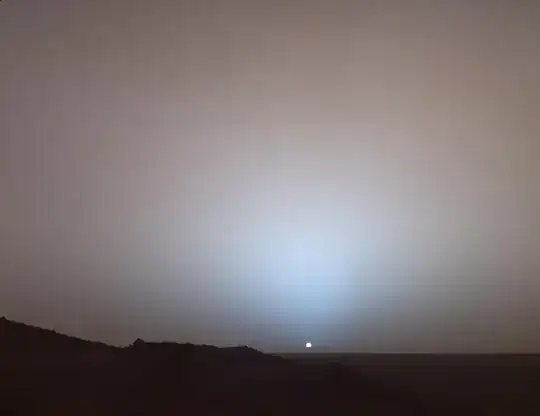[WARNING: I may be wrong. Astronomy is my hobby and I will answer to the extent that I know of. I may be a bit off.]
Mars' atmosphere contains I guess what you can say 2 major parts. Gases, and debris picked up by winds on the lower levels of the atmosphere (like Earth).
Gases
Mars' atmospheric gas composition mainly consists of CO$_2$.
More specifically, in an article page by NASA, Mars' atmosphere contains
Carbon dioxide: 95.32 percent
Nitrogen: 2.7 percent
Argon: 1.6 percent
Oxygen: 0.13 percent
Carbon monoxide: 0.08 percent
Also, minor amounts of: water vapor, nitrogen oxide, neon, hydrogen-deuterium-oxygen, krypton and xenon.
http://www.answers.com/Q/What_are_the_contents_of_Mars%27_atmosphere
Dust/other stuff
Mars' atmosphere, although 99~100 times thinner that that of Earth's, can support winds, weather/storms, and clouds. The winds are a major criterion to Mars' permanent atmospheric dust composition. Dust particles, airborne or not absorbing sunlight to some extent, which in turn warms up the atmosphere in and near their vicinity. Warm pockets of air flow toward colder regions, generating winds; the same effect here on Earth. Strong winds lift more dust off the ground, which in turn heats the atmosphere, raising more wind and kicking up more dust. This is amplified by Mars' axis tilt and momentum, which can contribute to Mars' massive dust storms encircling the planet.
In addition to the winds, the Martian atmosphere is dense enough to support vortexes. Dust devils routinely kick up the rusty dust that covers Mars' surface.
So we can see now the causes for such permanent content of dust in the atmosphere of Mars, with...
...higher amounts of dust in the northern fall and winter, and lower
amounts in the northern spring and summer.
https://www.space.com/16903-mars-atmosphere-climate-weather.html
Let's now take a look at Mars' surface dust composition.
Its dust mainly is composed of Perchlorate salts; Chlorine; Iron(III) Sulfide; NiFe; Sulfur; Iron Sulfide; Nickel; Silicon; Oxygen; Iron; Magnesium; Aluminum; Calcium; Potassium; Pyroxene; Plagioclase; Glass; Olivine; and Feldspar. I would imagine that the dust in the air would contain many of these same components as the surface dust, although some heavier salts and chemicals would only last a brief time in the air.
According to Wikipedia,
The NASA Phoenix lander first detected chlorine-based compounds such as calcium perchlorate. The levels detected contain 0.6% of the salt perchlorate.
and
The soil has a basic pH of 7.7
https://en.wikipedia.org/wiki/Mars
At such high levels, there should be definitely perchlorate salt in the air, but not necessarily permanent though, as the atmosphere may not be able to support the density of the salt.
However, a recent study of terrestrial dust devils has shown that around two thirds of the fine particles lifted by these vortices can remain suspended in the atmosphere and be transported around the globe. I would theorize that lighter salts would be able to remain suspended in the air, while heavier ones would slowly settle to the surface, given enough time. But hey, this is MARS! With those huge dust storms and continuous vortexes, I doubt there is enough time.
All of this suggests that during the times when there are rather windy conditions, such as in a close proximity to a dust devil, or during one of the dust storms, the atmosphere should contain almost the same concentrations of salts as in the soil itself.
During calm periods, the air dust content should still remain the same.
 Martian sunset (credit: NASA/JPL-Caltech/Texas A&M/Cornell) borrowed from this answer.
Martian sunset (credit: NASA/JPL-Caltech/Texas A&M/Cornell) borrowed from this answer.